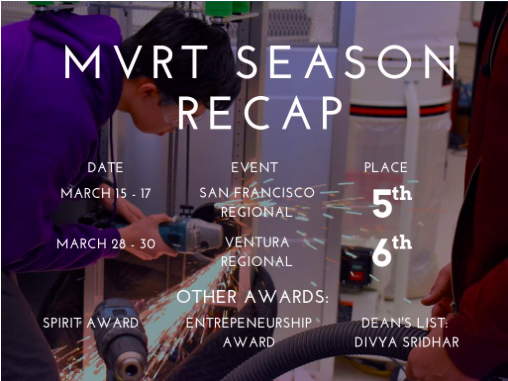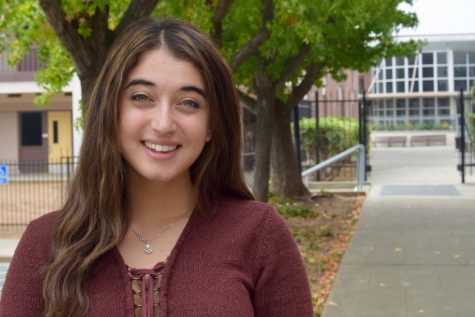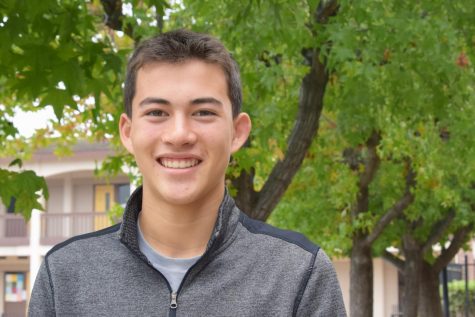The incremental successes: Monta Vista Robotics Team season recap
MVRT finishes the 2018-19 season with successful competition performances

May 24, 2019
During the summer before each school year, the Monta Vista Robotics Team (MVRT) hosts a program called Head Start, in which incoming underclassmen learn the necessary skills to join the team; these skills then are retaught during the larger training sessions. From September through December, the team hosted these training sessions three to four times a week, each with three to four hour long sessions regarding the necessary knowledge to build the team’s robots — tool safety, shop training, design and manipulator building. For personal exposure, members practice designing their own portfolios and building a resume.
From second semester onwards, the building season starts. For the first six weeks of the semester, the team builds a robot based on the “game,” or challenge, announced for that year. This year, the game was “Destination: Deep Space.” During the build season, the team met for six out of seven days of the week: three hours on weekdays and eight hours on weekends.
After the six weeks, the team participated in several competitions determined by a lottery system. According to Director of Outreach and senior Isha Chakraborty, due to the high price of competitions, the team participated in only two this year.
The ranking for each team is determined by an algorithm that considers various qualities such as the number of matches won and the pit speaking portion. During the pit speaking portion, teams block off a 10 by 10 feet area for themselves. Judges then come to teams to ask about the robot. As Director of Outreach, Chakraborty is one of three representatives that talks to the judges.
At the San Francisco Regional (SFR), MVRt ranked fifth and took the Entrepreneurship award. At the competition in Ventura, California, the team finished in sixth and received the Spirit award.
Along with competitions, the team had the chance to nominate two juniors to be considered for the Dean’s List, an award given to a student who has shown deep involvement in robotics and the entire community. This year, junior Divya Sridhar won regional awards for three separate regions and was also selected as one of four females worldwide to receive the Dean’s List award.
MVRT’s successful season was capped by some of their strongest showings in the semifinal rounds. According to junior Sophie Ye, such a feat would have been unthinkable in previous years – MVRT was not the strongest program in the robotics community, but according to sophomore Akash Palla, incremental improvements year by year have boosted their rankings.
“In 2016, we were not doing well at all,” Palla said. “We would barely get picked, [we were] ranked 24th. And over these past few years, we’ve really stepped up. Now we’re consistently in the top eight, we’re consistently making playoffs. We were a captain in Ventura, and we were the first pick of the second alliance in San Francisco.”
While MVRT was on the threshold of reaching the finals this year, some unforeseen circumstances ultimately led to them being knocked out. Ye, who was at both competitions, recognizes that there is a little bit of luck to making the finals of a robotics competition — even by changing one event the results of the competition could differ.
“In Ventura, we sort of got screwed over by the eliminations bracket,” Ye said. “We were up against the top alliance in the semifinals. In San Francisco, one of our alliance partners was having some robot issues and sometimes that just can’t be helped. We may have been able to beat [our opponents]. Given everything that has happened in the last couple of years, as long as you are resilient you can always bounce back.”
For Chakraborty, competition season felt like a gratifying result of the many hours spent developing the robot. According to her, her love of robotics increased with the time she spent with the team. Furthermore, being with the club and working on a robot for six weeks will be something she’ll miss from her time with the team since the summer of 2016.
“It kind of just becomes a part of your daily routine,” Chakraborty said. “It teaches you a lot about how to be accountable and knowing that your actions don’t only affect yourself but they also affect the other 200 people on the team. The 20 hours that we all [met] together [was] a lot. I hated it a lot when we did it, [but] at the end I kind of missed it.”


















